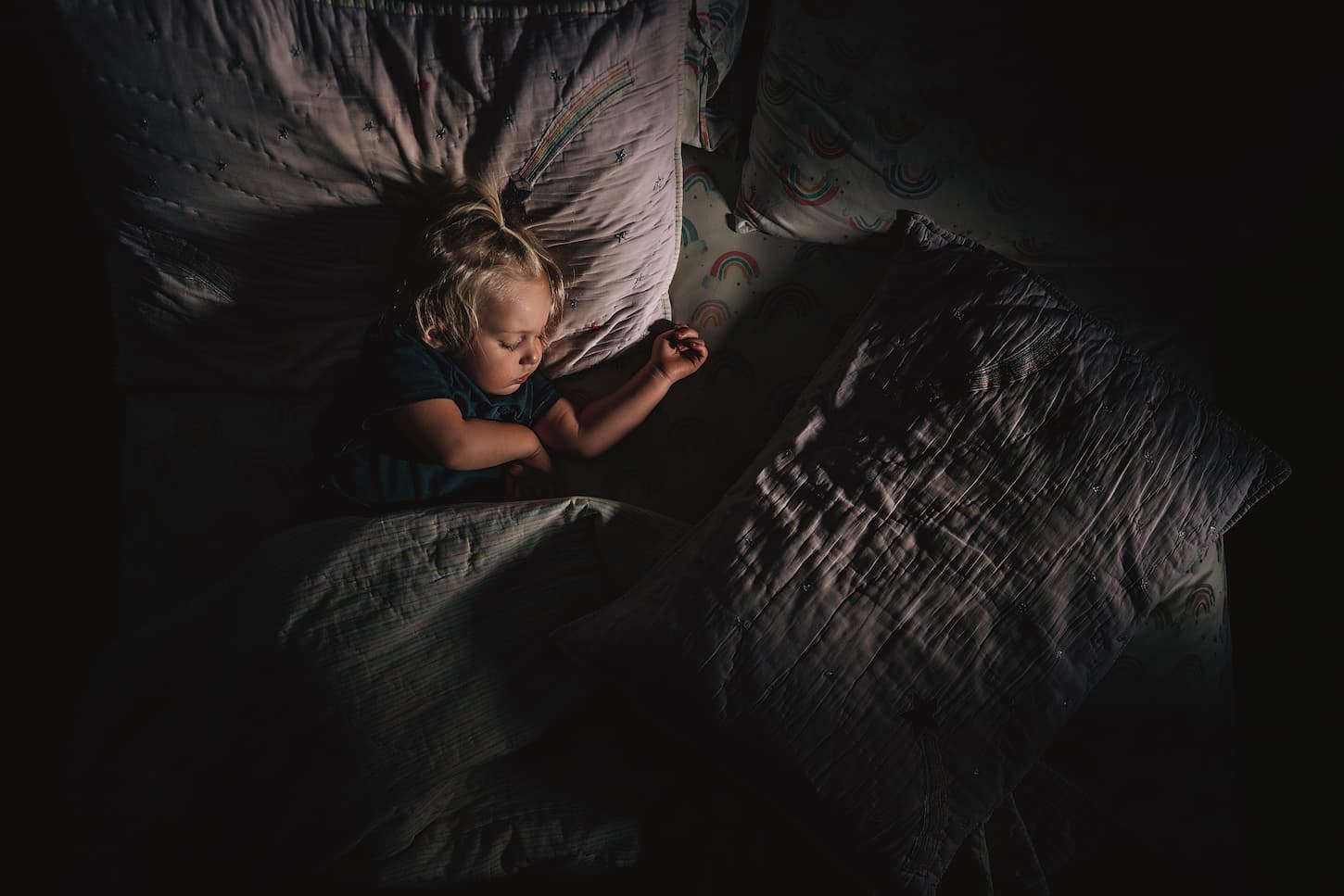One night, as I awoke to what I thought was the sound of my baby crying, I realized I’d dreamed it – and my baby was asleep. I wondered – if this sleep regression was over. If so, how do I know that it’s over?
How do you know when a sleep regression is over? You’ll know a sleep regression is over when your child has settled into a regular and reliable sleep-wake pattern. However, this post-regression sleep-wake cycle may or may not resemble the pre-regression pattern.
Want to get a better idea of how to know when a sleep regression is actually over? Keep reading for more information and examples!

How to Know When A Sleep Regression Is Over
Sleep regressions are over when your child falls back into a regular and reliable sleep pattern. Ideally, it’s similar to or better than what it used to be.
But how do you know it’s over? Well, odds are you won’t realize it’s over until it’s been a few days – and you’re starting to feel more like yourself because everyone’s getting enough sleep. That’s normal.
Let’s go into why that is – so that you can get a better idea about how to know when your child’s sleep regressions are over.
Sleep Regressions End Like They Start: As A Surprise Visible Best with Hindsight
Any time we aren’t getting enough sleep, our memory gets a little bit hazier. It gets harder to recall exact details with perfect clarity. And it gets harder for us to make new memories.
So is it any wonder that sometimes the exact details of when sleep regressions start and end get fuzzy? No, it’s not.
The fact that we’re also sleep deprived during sleep regressions is part of why it can be hard to identify when sleep regressions start and end. I’ve found that it’s only after I’ve had time to recover (and catch up on some sleep!) that I’m able to look back and realize exactly what was happening.
So if you’re in the same boat, don’t worry. You’re in good company. If a lack of sleep doesn’t mess with your memory, I applaud your superhuman powers.
How to Track Sleep Regressions (So You Know When They Start And End)
In any case, if you want to know exactly when sleep regressions end, there are a few ways to do it.
- Start a sleep journal for your children. This way, you’ll be able to track sleep regressions, sleep trends, and see the progress they’re making towards sleeping through the night.
- Make notes on an app on your phone. I’m a big fan of Google Keep, simply because I can access it on my phone or online – and it’s free.
- Use a baby feeding app – many of them let you take notes about how feedings go. I used several to keep notes about how nighttime sleeping went, too.
No matter where you want to keep notes, the important thing is this: write down trends!
You may think you’ll be able to remember every detail from the middle of the night, but I promise – it will fade. But if you write it down while it’s fresh, you’ll be able to have it on hand – and reference it as needed.
How Long Until This Sleep Regression Ends?
Most sleep regressions will last anywhere from a few days up to six weeks, with most lasting about 1-2 weeks.
There’s a huge range in there because dozens of factors can influence things. And when you consider that there may be multiple factors? Well, that quickly turns into millions of potential permutations.
If you’d like to read more about how long sleep regressions last, you can read my article (which has almost a dozen examples) right here.
In any case, let’s talk more about knowing how sleep regressions end. And this time, let’s use examples.
When Do Sleep Regressions End? (With Examples)
In most cases, babies will be able to adjust to sleep regressions on their own and they’ll end after a few days or weeks. After these sleep regressions, their sleep schedule will go back to what it was – or it’ll even be better.
Example: Several of my nieces and nephews have always been great sleepers. As babies, they did experience a few rough patches where they didn’t sleep as well – for up to a week. But then they settled back down on their own. My sister-in-law never used any formal sleep training techniques, although she did focus on building good sleep habits.
One nephew slept through the night by the time he was all of 2 months old – while the others were sleeping through the night (as in all night) by 9 months old.
If you’re in that boat, I’m so happy for you. Remember you’re in for a rough week or two (maybe a few weeks if it’s super bad), but it should self-resolve. If you practice good sleep habits, then it’ll resolve on the faster end of things.
However, if your children have a harder time sleeping at their baseline, then here’s a fun fact from a 2008 sleep study:
Findings support the hypothesis that maladaptive parental behaviors develop in reaction to preexisting sleep difficulties.
Longitudinal Study of Preschool Sleep Disturbance, Pediatric Adolesc Med Apr 2008
In other words, when babies (who naturally have a harder time sleeping) hit a sleep regression, it’s normal for us parents to step in and help. However, more often than not, our attempts to help turn into “maladaptive parental behaviors” – in other words, we fall back on negative sleep associations that make things worse – make sleep regressions last longer.
If you’d like to read more in-depth about sleep associations and how they relate to sleep regressions, click here to read my article.
In any case, our attempts to help backfire – usually because we’re going back to things that used to work. Things like rocking the baby, nursing them to sleep, or holding them. When I say holding them, I mean the kind of holding where we think we’re helping them fall asleep, when it’s keeping them up.
So now, our child who’d hit a sleep regression is waking up every 1-2 hours (due to how our natural sleep cycles string together) and we’re making it worse – we’re keeping them up.
From here, some babies may be able to learn how to self-soothe so that they go back to sleep – and the regression ends. More often than not, though, our babies get stuck in this vicious cycle of waking up every 1-2 hours. This leaves everyone overtired and cranky.
Example: At 6-7 months, our oldest son started waking up every 1-2 hours. We initially thought it was a growth spurt. After several awful nights, we realized we all needed an intervention. We began behavioral sleep training. Within a few nights, he was almost back to his previous sleep-wake cycle.
So what are the official end-of-sleep regressions? It’s once your baby gets back to sleeping well. So in this case, the sleep regression lasted a week – and then we needed another week to recover!
Finally, in some of the worst scenarios, a baby might only seem to recover from sleep regression, only to fall into a new sleeping pattern that’s nothing like what it was before – it’s much, much worse.
If the new pattern is different enough from the old one, it may be really difficult to know that the sleep regression is over.
In these cases, what may have happened is a series of unfortunate events, kind of like what once happened to us.
Example: One of our children hit a developmental milestone and had sleep regression. Before they could return to a normal sleep-wake cycle, they got sick. Just as they were getting better, we went on a long-scheduled vacation to visit family out of state.
That was a rough few months – because it was a never-ending cycle of awful nights and sleep deprivation. Technically, this thrice-cursed sleep disruption did carry on for several months before it finally ended. But if we hadn’t been hit with a big case of bad timing, it would have been resolved much sooner.
So the odds of you seeing a crazy-long, never-ending sleep regression are quite rare – unless you have the kind of timing we did.
In any of these cases, behavioral sleep training is the best option for everyone!
Behavioral-based sleep training teaches parents what to expect, how to cope, and what to do to help their children learn to self-soothe back to sleep between natural sleep cycles.
Once we wised up (thank you, behavioral sleep training!), we were able to see sleep regressions and disturbances for what they were: they aren’t some huge problem. They’re part of growing up.
And so while your child may experience anywhere from just a few to multiple sleep regressions while growing up, it’s okay. It’s not a real problem – it’s just something that, as humans, we have to learn to recognize and manage.
That way, we know when a sleep regression is over – and we can all get back to sleep already.

Related Questions
How Do You Survive the 4-Month Sleep Regression? To survive, focus on one day at a time. Then use behavioral sleep training to effect a positive change. Finally, ask friends and family for help.
What Causes Sleep Regression? Sleep regressions are caused by significant life changes that disrupt regular sleep patterns. Common causes include reaching developmental milestones, time changes, or learning new tasks such as walking.
Is There a Sleep Regression at 7 months old? There can be sleep regression at 7 months if your child is experiencing a developmental milestone or anything else that has disrupted their usual sleep pattern.